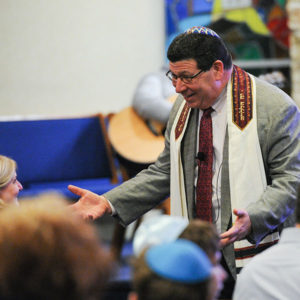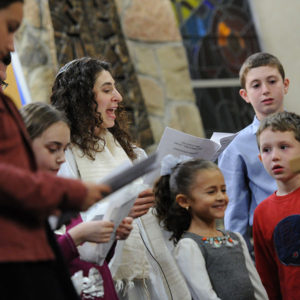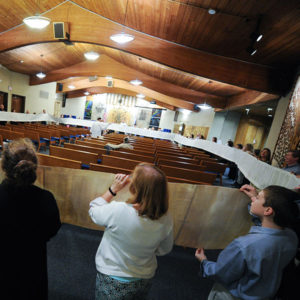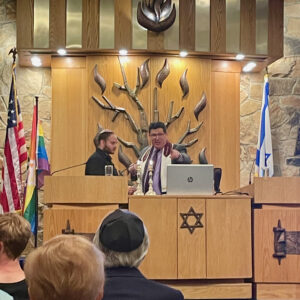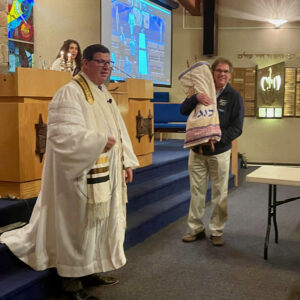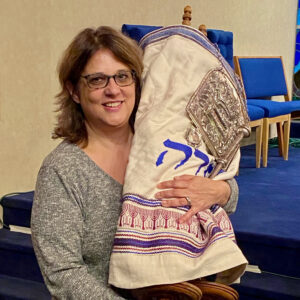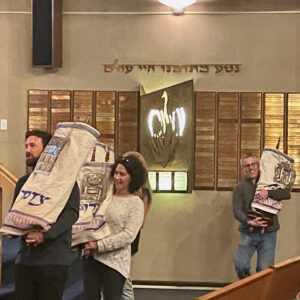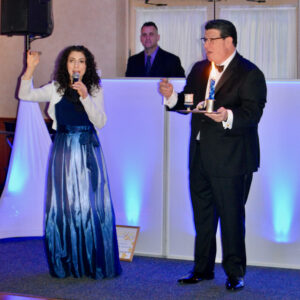Please Join Us
Prayer is a language that each of us speaks and hears in a different way. When we pray together, we try to find meaning within the chorus of diverse voices. With engaging sermons, stimulating teachings, and meaningful prayer intertwined with music, our clergy show us how the lessons from the past are relevant to our lives today.
Through a wide range of spiritual experiences we offer something for everyone, including weekly Shabbat evening and Shabbat morning services. In addition, special services are held throughout the year which include “Pray and Play,” “Shalom Yoga,” and so much more.
Our services are fully egalitarian (men and women participate equally). We believe we have found a healthy balance between the traditional and the creative. Services are a blend of Hebrew and English that helps everyone feel comfortable. Our prayer book, Mishkan T’filah, contains transliterations adjacent to all Hebrew prayers so that everyone, including guests, can participate easily and fully. We use both traditional and contemporary melodies. People who attend vary from those with traditional backgrounds to Jews by choice as well as guests of all faiths.
Schedule of Services:
Shabbat Evening Service
Erev Shabbat Services: Fridays, 7:30 pm (except the 1st Friday night of the month)
Kabbalat Shabbat Services: 1st Friday night of the month – 6:30 pmMorning Service
Saturdays
10:30 am, September - JuneRock Shabbat Services
Check here for more information on our next musical Shabbat service.
Rabbi's Most Recent Shabbat Greetings:
The special Torah portion for the intermediate days of Passover on Shabbat is from Exodus 33:12-34:26 and Numbers 28:19-25. As suggested from Reform Judaism, On the Shabbat during Passover, we are reminded of the age-old desire to know God. Moses implores God to let him see God. While God will not allow Moses to see God’s face, God tells Moses, “I will make My goodness pass before you…” Perhaps we experience the divine presence through the goodness we create in the world. The Torah then sets forth the thirteen attributes of God, among them that God is compassionate, gracious, slow to anger and abounding in kindness. By emulating these very attributes, we create the goodness which allows us to know God.
Moses Maimonides, following the early midrashic work, Sifrei, argued that the section would be better known as the 13 d’rachim, “ways” of God: or, better still, ways that we can embrace to be god-like since “knowing” God is not really possible either from the perspective of Judaism’s radical monotheism or, for that matter, from the perspective of most branches of philosophy. Thus, proponents both of positive and negative theology turn to Exodus 34:6-7 to ground themselves in a viable Jewish theology of God.
According to Rabbi Lance Sussman, “The place of the 13 Attributes in the text of the Torah is important. They appear just after the story of the Golden Calf. Seeing what the people have done in his absence, Moses smashes the first set of tablets. Punishment is then exacted upon the guilty Levites and a general plague serves as a further scourge among the people. Only then does Moses go back up Mount Sinai and cut a second set of tablets. The Eternal One, the Torah reports, passes before Moses and proclaims (according to the prayer book version of the passage): “Adonai, Adonai, a God compassionate and gracious, slow to anger, abounding in kindness and faithfulness, extending kindness to the thousandth generation, forgiving iniquity, transgression and sin, and granting pardon” (Mishkan T’filah, [NY: CCAR, 2007], p. 496).”
Rabbi Sussman continues, “What is most remarkable about this passage is its emphasis on the ethical. God is not called holy or commanding or jealous. Instead, God self-describes as first and foremost, an ethical being. In fact, it would be even more accurate to call God in this passage “the Ethical Being” or, perhaps, the ethical ground of all being.”
From a mystical perspective, Moses’ response to the disaster is a big lesson for anyone who wants to know how to respond in cases where it seems to us that our vision has collapsed, our business has collapsed and all our dreams fell into the abyss. Moses does all he can to focus on the minimization of the disaster and on an immediate treatment for the problem. Moses’ prayer to the Creator, he focuses on what appears to be the most important matter. Instead of being immersed in feelings of guilt and despair, loss and frustration, Moses focuses on something else: He came to the Creator of the world with a demand that is seemingly Chutzpah. After all the gifts that the Israelites have received: Ten Plagues, the Exodus, the pillar of fire and the pillar of cloud, The Splitting of the Sea of Reeds, manna and water from the rock and especially Mount Sinai Revelation and the transcendence over death, Moses claims that this is not enough to purify the death and slavery from the heart of man, and it requires an even more powerful remedy. God’s answer is the Thirteen Attributes, another gift; Kabbalists claim that its power comes from the highest places in the tree of life. These Thirteen Attributes are a gift that promises forgiveness and atonement, the heart and mind remedy.
Thus during this festival of Passover, our season of freedom, we are reminded that our dream is not fulfilled in its entirety for all. But if there is any meaning to redemption at all, it must be for human beings to imitate the ways of God, not to allow that shortcoming of our behavior to conclude that there is no hope. On the contrary, we are called to recognize that there is some good in everyone – even if it occurred many years ago and, therefore, they merit our forgiveness and our love. In this way will the redemption promised by this festival be made real.
SHABBAT SHALOM AND CHAG SAMEACH PESACH
Keep Reading